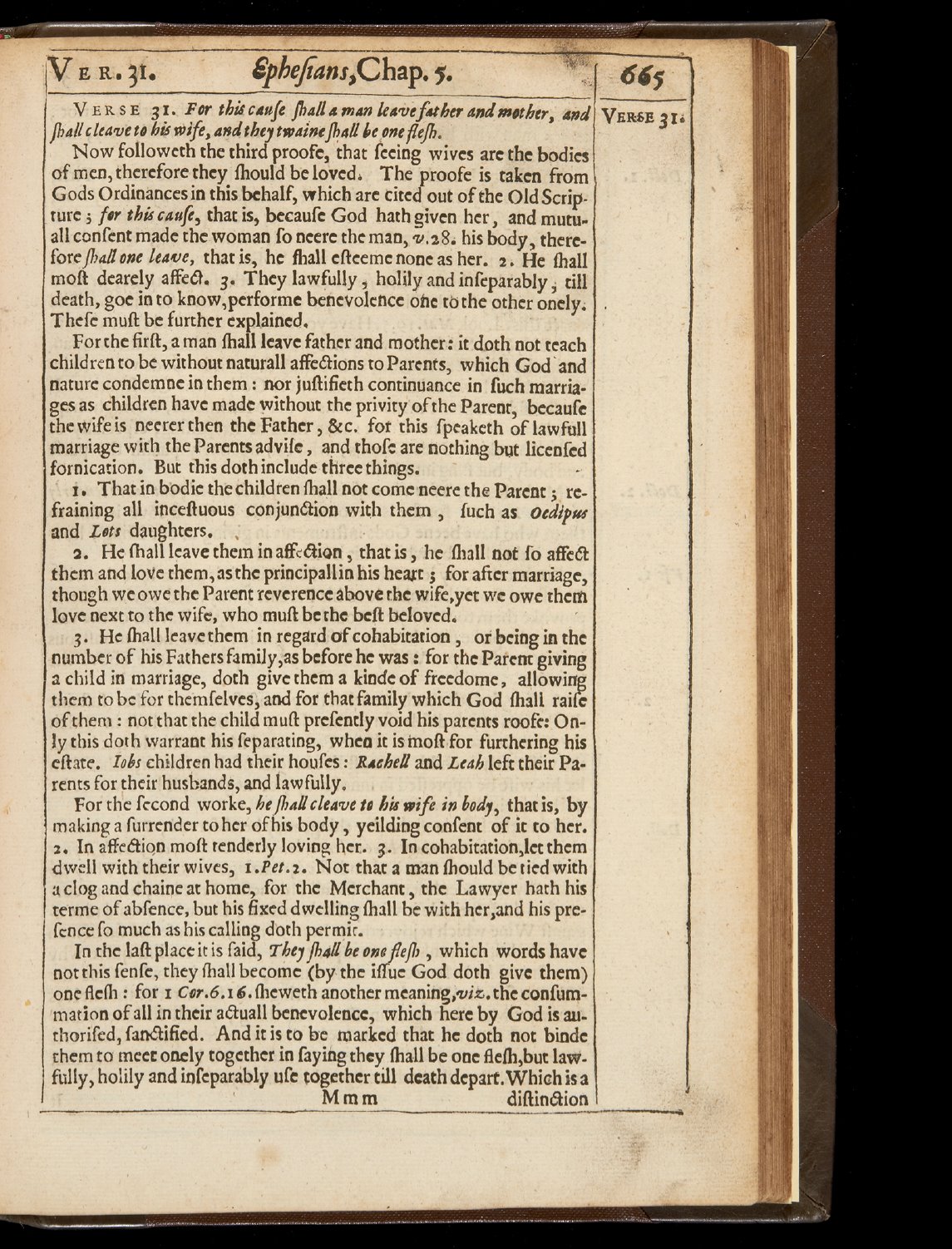

,V
E
R.
3t.
ephefian.r,Chap.
5.
VERSE
31. For
this
cattle
/hall a
man
leavefather and
mother,
and
fhall
cleave
to
bù
wife,
and
they
twain
hall
be
one
flefh.
Now
followeth the third proofe, that
teeing wives are
the
bodies
of
men,
therefore they
fhould be
loved,
The
proofe
is
taken from
Gods Ordinances
in
this
behalf, which
are cited out
of
the Old
Scrip-
ture
;
for
this
caufe,
that
is, becaufe
God
hath given
her,
and mum
-
all
content made the woman
fo neere
the man,
v.28.
his
body,
there-
forefhall
one
leave,
that
is, he
(hall
efteeme none
as
her. 2. He
fhall
moft dearely
affec).
3.
They lawfully,
holily
and
infeparably;
till
death, goe
into
know,performe
benevolence one to
the
other onely.
Thcfe
muff
be further explained.
For the
fiat,
a
man (hallleave father and
mother:
it
doth
not teach
children
to
be without naturali
affe
&ions
to
Parents, which God
and
nature condemne
in
them
:
nor
juftifieth continuance
in
fuch marria-
ges
as
children have made without the privity
ofthe
Parent,
becaufe
the
wife
is
neerer then
the Father
,
&c. for this
fpeaketh
of
lawfull
marriage
with the Parents
advice
,
and
thofe
are
nothing but
licenfed
fornication.
But this
doth
include
three things.
I.
That
in
bodie the children
(hall
not come
neere
the Parent
;
re-
fraining all
inceftuous conjunélion
with them
, fuch as
oedipus
and
Lots
daughters.
2. He
(hall leave
them
in
affcfiion ,
that
is
, he
(hall
not
fo
affeét
them
and love
them,
as
the
principallin his heart ; for after marriage,
though we owe
the Parent
reverence above
the
wife,yet we
owe them
love
next to
the
wife,
who mutt
be
the bell beloved.
3.
He
¡hall
leave
them
in
regard
of
cohabitation
,
or
being
in
the
number
of
his
Fathers family,as before he was
:
for the Parent
giving
a
child
in
marriage, doth give them
a
kinde
of
freedome, allowing
them tobe
for themfelves,
and
for that family
which God
(hall
raite
of
them
:
not
that the
child
mutt prefently
void
his parents roofe:
On-
ly this Both
warrant
his
feparating, when
it is
íno¡t for furthering
his
elate.
robs
children
had
their
holies
:
Rachel!
and
Leah
left their Pa-
rents for their husbands,
and
lawfully.
For the fccond worke,
he
¡hallcleave
to
his
wife in
body,
that
is,
by
making
a
furrender
to her
of
his
body,
yeilding content
of
it to her.
a. In
affec
tión
molt
tenderly loving her.
3.
In cohabitation,letthem
dwell with their
wives, z.
Pet.
z.
Not
that
a
man (hould be tied with
a
clog
and chaîne at
home,
for the
Merchant, the Lawyer
bath
his
terme
of
abfence, but
his
fixed
dwelling
(hall
be with her,and
his
pre-
tence
fo
much
as
his
calling
doth
permit..
In
the
laft place
it is
faid,
They
fhall
be one
flefh
,
which words have
not
this
fenfe,
They
(hall
become
(by the
iffue
God doth
give
them)
one
fle(h
:
for
z
Cor.6.16. fheweth another
meaning,viz. the
confum-
mation
of
all in
their
aâuall
benevolence,
which
here
by God
is
au-
thorifed,
fanétified.
And
it
is
to be
marked
that
he
doth not
binde
them
to
meet onely together
in
faying
they
(hall
be one
flefh,but law-
fully, holily and infeparably
ufe
together till
death depart.
Which
is a
M
m
m
diltinétion
VERSE
3
r.

















